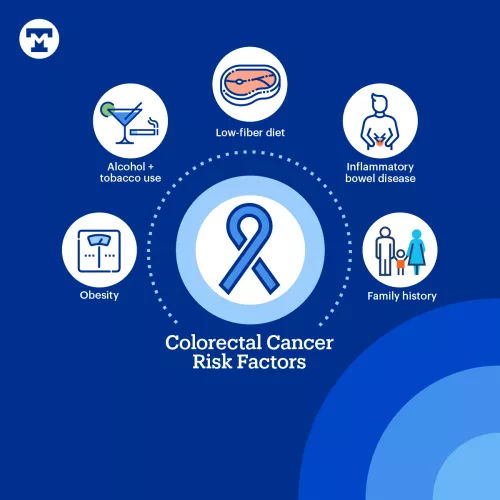
March is National Colorectal Cancer Awareness Month. Colon cancer is still the second leading cause of cancer deaths, resulting in over 850,000 deaths worldwide each year, and with almost 53,000 deaths related to the disease expected to occur in the U.S. in 2024.
Many of these cases could have been prevented with the help of our most valuable tool in the fight and prevention of colon cancer – colonoscopy. By increasing the number of people who come in for colonoscopies, we'll reduce the number of people dying from colon cancer – it's that simple.
What is colon cancer?
According to Dr. Aarti Kakkar, Chair of the Division of Gastroenterology at MelroseWakefield Hospital, colorectal or colon cancer refers to the group of cancers that affect the colon and rectum (also called the large intestine). "About one in 20 people will develop colon cancer at some point during their lives, making this one of the most common cancers in the U.S.," said Dr. Kakkar. These diseases usually are caused by the growth of polyps – small masses of cells – in the rectum or colon. Though these growths start as benign (noncancerous), they can develop into cancerous tumors over time.
Who should have a colonoscopy, + when?
"The recent rise in colon cancer cases among younger people is worrisome and has led the major professional medical societies including the American Cancer Society, the American College of Gastroenterology and the US Preventive Services Task Force to advise lowering screening from age 50 to age 45 for patients with no risk factors," said Dr. Kakkar. "This is a recent and important change."
This speaks to the importance of earlier colonoscopy screening for those who have a higher risk of developing colon cancer – and knowing what symptoms should send you to the doctor's office. With regular colonoscopies, we have a window of opportunity to catch developing polyps and remove them, which makes colon cancer one of the most preventable types of cancer. "Colonoscopy is the most effective form of preventing colon cancer because if we find a polyp during the colonoscopy, we can remove it on the spot," she said.
Colon cancer symptoms + risk factors
Colon cancer can be asymptomatic, meaning it doesn't show any symptoms until the disease has progressed to later stages. Even then, the symptoms of colon cancer can be vague and similar to symptoms of common gastrointestinal issues such as hemorrhoids, ulcers or colitis (inflamed colon).
That said, colon cancer symptoms can include:
- Abdominal pain
- Bleeding from the rectum
- Changes in bowel habits (constipation, diarrhea or thinner stool)
- Decreased appetite
- Persistent tiredness or fatigue
- Unexplained weight loss
- Iron deficiency anemia
If you notice these symptoms, visit your doctor to see if you need a colon evaluation.
It's especially important to be aware of colon cancer symptoms if you know you're at high risk for the disease. Several factors can raise your risk, including:
- Alcohol: Heavy alcohol use – more than two drinks per day for men and more than one for women.
- Diet: Those who eat a lot of red meat and processed meat have a higher risk, especially if they eat few vegetables, fruits and whole-grain fibers.
- Family history: People with an immediate family member who has had colon cancer or polyps are two to three times more likely to develop it themselves.
- Inflammatory bowel disease: Patients with ulcerative colitis or Crohn's disease should be followed by a gastroenterologist given their increased risk.
- Obesity: People who are obese are about 30 percent more likely to develop colon cancer than those who aren't obese.
- Tobacco: Smokers are at risk for many cancers, including colon cancer.
Millennials are now more at risk for colon cancer
In an alarming trend, millennials are now about twice as likely to develop colon cancer and four times as likely to develop rectal cancer compared to people born prior to 1950. From the mid-1980s through 2013 colon cancer rates found in those ages 20-29 rose up to 2.4 percent per year.
"This trend has raised a lot of questions about who should be screened for colorectal cancer and when. The number of people younger than 50 who develop these cancers is still relatively low compared to those older than 50, who make up 90 percent of new colon cancer cases," said Dr. Kakkar. "However, as mentioned previously, these findings have led the American Cancer Society to advise starting screening at age 45."
It's not yet clear why more people younger than 50 are getting colon cancer. That makes prevention and early screening all the more important.
Avoiding colon cancer
Maintaining a healthy lifestyle will reduce your risk for colon cancer. That includes avoiding tobacco, keeping a healthy weight, being physically active and eating a high-fiber diet while avoiding too many red or processed meats.
Other than keeping those healthy habits, Dr. Kakkar suggests the following:
- If you're 45 or older: Schedule a colonoscopy as soon as you can.
- If you're younger than 45, but have any risk factors for colon cancer: Talk with your doctor or see a specialist (gastroenterologist) to discuss when you should start screening.
If you have any concerning symptoms: Don't wait to see your doctor or a gastroenterologist. Even younger adults can get colon cancer.